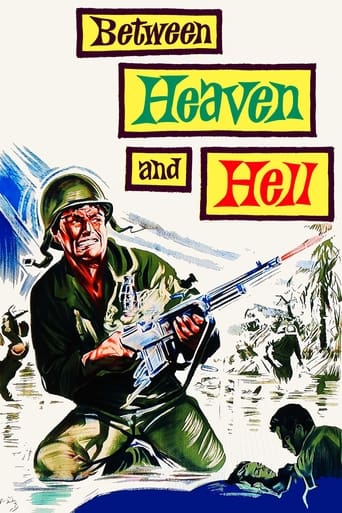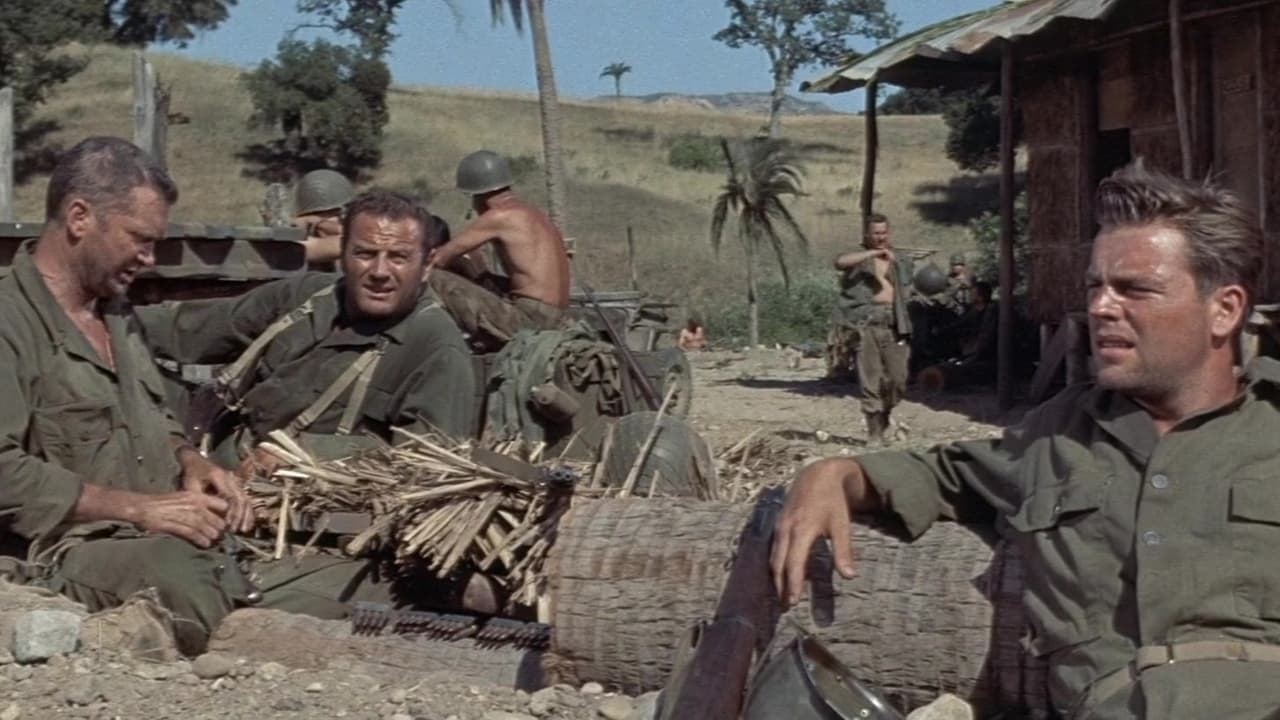writers_reign
Richard Fleisher's directorial career echoed, arguably on a smaller scale, that of David Lean in that both men turned in top-drawer small scale films at the start of their careers - The Narrow Margin, Brief Encounter etc - and then tended to get bogged down with 'epics'. Between Heaven and Hell sees Fleisher on the cusp, taking a hackneyed theme, Redemption, and making it seem if not quite new-minted at least months away from its sell by date. This time around it' pretty boy Robert Wagner who clearly models his pre-second world war Plantation owner on Simon Legree, gets caught in the draft and by serving alongside men who, in another life could well have been sharecroppers on his plantation - and one, Buddy Ebsen, actually was - sees them in a new light and becomes a better person. Broderick Crawford is the scenery-chewing maverick in an outpost that owes more than a little to Conrad's Heart of Darkness and the likes of Robert Keith, Harvey Lembeck and Skip Homier offer sterling support. One that got away.
zardoz-13
"Violent Saturday" director Richard Fleischer's explosive, bullet-riddled epic "Between Heaven & Hell" combines the plot about clashes between subordinates and their superior officers set against the backdrop of World War II combat in the Pacific with the problem melodrama about Old and New South social consciousness. Robert Wagner starts out as an elitist, bourbon & branch water swilling, Southern cotton gin operator who displays no sympathy for his poor sharecroppers. Before this sturdy 94-minute, Cinemascope movie fades out, the protagonist turns over a new leaf and becomes a more considerate individual who is concerned about the welfare of his workers. The clash between officers in Fleischer's film reached the screen a mere six days before director Robert Aldritch's cynical wartime thriller "Attack." "Between Heaven and Hell" came out October 11, 1956, while "Attack" debuted October 17, 1956. Nevertheless, "Attack" ranks as a more compelling outing because Robert Wagner's NCO doesn't kill the pusillanimous officer, while Lt. Harold 'Harry' Woodruff (William Smithers) in "Attack" kills a cowardly officer. Interestingly enough, Buddy Ebsen appeared in both movies as a G.I. Unlike "Attack," "Between Heaven and Hell" confronts the issue of inequity between poor whites and affluent whites in the Old South. Actually, "Attack" surpasses "Between Heaven and Hell," but the latter picture adds weight to the trend in American World War II movies about clashes between commanders and subordinates. Like the Aldritch film, "Between Heaven and Hell" painted an unsavory portrait of life in the military that showed American soldiers with feet of clay that films such as "The Naked and the Dead," "Tarawa Beachhead" and "The Victors" would build on in later years.The Fleischer film opens with two soldiers escorting Private Sam Francis Gifford (Robert Wagner of "Titanic") to see Lieutenant Colonel Miles (Frank Gerstle of "D.O.A") about a disciplinary problem after Sam has been arrested for attempting to kill a superior officer. Matters are complicated somewhat because Sam has received a Silver Star for dangling himself off the side of a cliff to sling explosives into a Japanese machine gun emplacement in a cave, a setting that suggests that this exploit occurred on Guadalcanal. Since Sam has won the medal, Miles prefers to send him to serve with George Company rather than imprison him in Leavenworth. The grim dialogue between Sam and the driver of the jeep, Private Willie Crawford (Buddy Ebsen of "Parachute Battalion") suggests that prison would be preferable. Crawford observes as he hands his M-1 rifle to Sam. "Go ahead and kill someone, I don't care. How did you get in this outfit?" Sam replies without enthusiasm, "It was that or Leavenworth." Crawford shrugs, "Shoulda taken Leavenworth." Sam meets his new superior officer, off-his-rocker Captain 'Waco' Grimes, Commanding Officer, who stipulates that nobody can call him by his rank. Waco dreads that a Japanese sniper will kill him, so he insists that nobody refer to him by his rank. Waco keeps two Thompson machine-gun wielding soldiers at his sides at all times, Private. Swanson (Skip Homeier of "The Gunfighter") and Private Millard (Frank Gorshin of "Batman"), and they wear only t-shirts on this upper chests rather than proper combat fatigues. Waco makes Sam his radio operator and Sam stretches out on the ground after Waco dismisses him and stares into a mud hole. The surface of the mud hole ripples when Sam tosses a pebble in it and the film shifts into flashback mode some 15 minutes into the action to take us back before Pearl Harbor to the South when Sam was a heartless but well-heeled cotton gin operator who had married Jenny (Terry Moore of "Mighty Joe Young") and they were living high off the hog. We learn Jenny's father, Colonel Cousins (Robert Keith of "Branded"),commands Sam's National Guard outfit and organizes it to mobilize for duty. Before his call to duty after Pearl Harbor, Sam reprimands the laziness of his sharecroppers and treats them like dirt. Our hero buddies up with several G.I.s and they become fast friends until they die. Foremost among them is a country boy named Private Crawford. It seems that Sam and his friends were checking out a village when an officer got a case of the nerves and shot Sam's three friends. Sam clobbers the lieutenant with his rifle butt and winds up behind the wire."Between Heaven and Hell" suffers minimally from the usual idiocy that afflicts many Hollywood World War II movies. Specifically, American officers wear their rank on the front of their helmets—rather than the rear--making him easy for vigilant Japanese snipers. Unlike most World War II movies, an officer here who dons his helmet with his rank prominently on show dies from a sharpshooting enemy marksman. Top-notch photography by "The Day the Earth Stood Still" lenser Leo Tover gives "Between Heaven and Hell" a sprawling, virile appearance, that belies its actual location at the Twentieth Century-Fox ranch in the Santa Monica Mountains, while "Dead Reckoning" composer Hugo Friedhofer received an Academy Award nomination for his orchestral score. Fleischer conjures up commendable suspense and excitement primarily with the standard theme of friendship; soldiers who buddy up suddenly have to confront the loss of their new-found friends. Meanwhile, this above-average combat opus boasts a cast of first-class thespians that includes Broderick Crawford, Buddy Ebsen, Brad Dexter, Ken Clark, Frank Gorshin, Skip Homeier, and Harvey Lembeck. Fleischer and "D-Day, The Sixth of June" & "A Walk in the Sun" scenarist Harry Brown, who adapted Arkansas-born novelist Francis Gwaltney's 1955 fiction book "The Day the Century Ended," give their military fans more than enough firefights to past muster. Interestingly, Rod Serling tried without success to adapt the Gwaltney novel. Moreover, Gwaltney was a Pacific campaign veteran. American Film Institute records state that,John Sturges was scheduled to helm it. Guy Madison was up for the Robert Wagner role and Twentieth Century Fox contract actress Joan Collins was considered for the role that Terry Moore inherited.
kayaker36
Philadelphia-born Broderick Crawford makes an unlikely Texan and--wisely--does not try to sound like someone from Waco. But "Waco" is the nickname by which the soldiers in 'G' company are ordered to address him, never "Sir" or "Captain". You see, he doesn't want enemy snipers targeting him--a prudent precaution. However, this officer also is afraid, paranoid in fact, that one of his own men might decide to kill him. Accordingly, any soldier entering Company HQ must leave his weapon outside, and the Company commander is escorted at all times by two enlisted bodyguards armed with Thompson submachine guns.These two blond pretty boys apparently lead a privileged life and they may be more than just bodyguards. They sit languidly about in the grass shack, fondling their weapons and dressed in skimpy and tight-fitting undershirts--every other character in the wartime part of film wears full combat dress. In an early scene, after a typically harsh interview with a replacement soldier, the C.O. is seen retiring to his private quarters in the company of one of these bodyguards. And when that man is later killed in a surprise mortar attack, the gruff, veteran officer is said to have wept! A point is also made of the captain being unmarried. The script of this film is run of the mill. Crawford gets all the memorable lines.The state park in Calabassas, California looks nothing like a South Pacific island. Scenes lurch abruptly from the prewar American South to the battlefront. However, there are some really memorable performances--by a young, almost adolescent, Robert Wagner, by Buddy Ebsen and in particular by Crawford as the psychotic--and possibly perverted--company commander. Among other supporting players, Brad Dexter as a battle-hardened lieutenant disgusted by what he sees at Company HQ and not bashful about showing it, and the portrayal of an arrogant, overbearing bodyguard by the always interesting Skip Homeier merit special mention.
rspnov
Considering that Cinemascope had been introduced only three years earlier, this is one of the outstanding examples from the 50s of a director and cinematographer composing shots for widescreen. I've been teaching film for almost 40 years and would unhesitatingly show excerpts from this in any basic course on movies. Just to sample some, check out Minutes 40-50, especially the quartets of lounging soldiers in medium shot. Sometimes the compositions seem a little self-conscious, but overall this is a remarkable film stylistically. It's wonderful to be able to see it again in widescreen format, as well as other movies that go back to my teenage years. That's why DVD is so great.


 AD
AD




